Last month, I vowed not to buy more books until I removed a minimum of 25 books from my apartment. I added a rule that cleaning books off of the bookshelves doesn't count. Those are bonus books. I have to remove 25 books from the "to be read" piles, and so far I am at 8 counting the ones from June that I took to the used bookstore. Maybe August will slow down (doubtful, but maybe), and I can make some more progress.
I chipped away at it a little bit in July, but one of the books I finished this month was a Kindle book and one is a book I felt like keeping for a while, so all of the books I read this month don't figure into the total. I do have a theme this month, since that's something I randomly started doing in June and May, and decided to read memoirs or books where people write about themselves.
Here's how I did:
1) Emily Spivack's Worn Stories was interesting. Spivack gathered sixty mini-memoirs from people both famous and not, told in the form of clothing. Each story featured a photo and then a page or two of why it was important to that person, and the stories ranged from lighthearted to very serious. I don't usually notice book design, but I liked that rather than a glossy cover the whole book was covered in fabric, so that it felt like the clothing featured within.
One of the things I liked about this book was looking through my own closet and trying to figure out which piece of clothing I would want to represent me. Shoes? A tie? The shirt on my wall from 2004 that I've never been able to wear but remain hopeful about? I don't know, but I guess I don't really have to. I might send something in to the Worn Stories website someday, but it doesn't have to be today.
2) Judy Greer's I Don't Know What You Know Me From was funny, but seemed to go on a shade too long at the end. It was a good read, though, and is one of the two books I read this month that made me laugh out loud in a restaurant while I was eating alone and reading. It also made me want to watch a Judy Greer movie, and as I started picking through my DVD collection to narrow one down I found out that even though I don't deliberately collect films with her in them I have almost as many movies starring Judy Greer as I do starring Lana Turner, and I like Lana Turner.
Judy Greer, as she said in her book, really has been in everything with everyone. In my own DVD collection alone she stars in:
Jawbreaker
13 Going On 30
27 Dresses
Carrie
and a ton of stuff that I've seen and don't own. You go, Judy Greer.
3) Remember when you watched Clerks and you thought, "Wow, this is different. Kevin Smith has something different and interesting to say and I would like to see more of his work," but then you watched Clerks 2 and you thought, "Wow, Kevin Smith is really invested in being Kevin Smith more than he is in actually saying anything new, different, or groundbreaking"? Maybe you didn't think that and it was just me who did, but reading Kevin Smith's Tough Sh*t was a lot like watching "Clerks 2". There was some funny stuff in here, and some interesting thoughts about movies, comic books, and life in general, but there was also a lot of stuff where it felt like he was just trying to be edgy, irreverent, and vulgar just for the sake of being able to do so, not for any reason that actually served the book. For example, the entire chapter devoted to his father's testicles and how powerful his ejaculate must be and how awesome those testicles are because they spawned Kevin Smith is just too much and feels like it's trying too hard, especially as the first chapter of the book.
4) Chris Kluwe's Beautifully Unique Sparkleponies was also a bit of a letdown. I've enjoyed reading Kluwe's articles in various places over the past few years, as he speaks bluntly but truthfully about equality, football, greed, and life in general, so I thought I would enjoy reading a whole bunch of his writing at once. Unfortunately, it turns out that I only like Kluwe's writing in small doses, and by the end of this sometimes funny book I felt like I'd had enough of Chris Kluwe's thoughts for a while.
5) Bill Bryson's The Life and Times of the Thunderbolt Kid was an amusing, but not laugh out loud funny, look back at growing up in Des Moines, Iowa, in the 1950's. The stories were cute, and juxtaposing them against national events taking place at the same time gave them a weightier context, but after reading this the main thing I wanted to know more than anything was whether or not peeing on a Lincoln Log actually will turn it white.
Unfortunately, I will never know, because the book said you had to pee on it more than once, and I feel like people would really strongly judge me if I added "keeping a urine-soaked Lincoln Log in the spare bathroom" to the list of weird hermit behaviors that already take place in my apartment.
6) Rebecca Harrington's I'll Have What She's Having was hands-down the best book that I read this month. I laughed over and over, once even snort laughing so loud that people around me at lunch heard me and stared, but I don't care because her talking about being dizzy from hunger on Posh Spice's "5 Hands" diet was killing me. She got dizzy and hungry on a lot of the diets in this book, which was her account of trying out different celebrity diets for a week. Another highlight is her account of the jittery caffeine overload caused by drinking ten Diet Cokes a day on Karl Lagerfeld's diet plan (Karl Lagerfeld has published a diet plan? Who knew?), and trying to follow the workout videos from Madonna's trainer while following Madonna's diet. There wasn't a lot of substance to this, but Gwyneth Paltrow's sesame pancakes (which actually sound more like crepes) sound like something I actually want to try, and I'm concerned that Dolly Parton's account of how she chews food just for the flavor and then spits it out is actually an eating disorder. Overall, I really enjoyed this book.
This leaves me 13 books to get through in August in order to be able to buy books again in September.
We'll see how that goes.
Friday, July 31, 2015
Sunday, July 26, 2015
A Special Occasion
I had this bottle of wine sitting around my apartment:
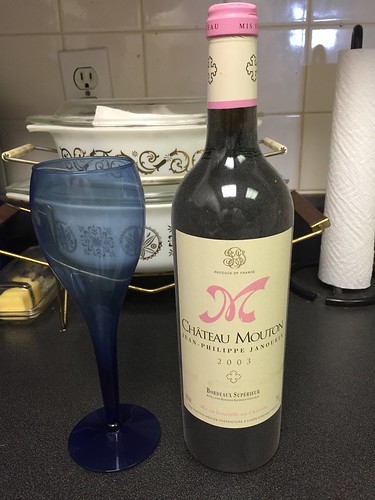
It's been sitting around since I moved here, because I haven't really had an occasion to drink it. I've had lots of occasions to drink wine, and have consumed a lot of wine in my apartment in glasses and in food, but I haven't had occasion to drink that specific bottle of wine because I was waiting for a special occasion. Back when I was moving from Albany to Tennessee my non-boyfriend boyfriend gave me this bottle of wine as a going away present.
"This is really good wine, and I want you to save this bottle until you have something really good to celebrate, like you win the lottery, or you and a guy move in together, or you get your next promotion, and then you go ahead and drink this wine to celebrate."
When I moved here, my friend Tiffany kept it in her car on the passenger seat for the entire ride down, so that it would stay in the air conditioning and not get broken in the U-Haul truck. I've had that bottle sitting in my wine rack since 2006.
This is not to say that I haven't had special occasions. I've gotten raises and reclassifications. I got a new car. I went on some dates. A whole bunch of stuff has happened, but every time something came up and I thought about opening the wine, I thought, "Well, is this special enough? Is this worth my special bottle of special wine, or will something even better happen and then I'll feel bad about drinking this?"
I kind of forgot something important, though: You will never appreciate the things that you have if you are too busy waiting for something better.
Devaluing my special occasions in the hope that some other, more special occasion will happen in the future is stupid.
So is saving this bottle of wine.
I was thinking about that the other day when I was cleaning the kitchen and my eyes fell upon the special bottle of special wine and I thought, "How special is that, anyway?" It turns out that it's not actually that special. Being the sensitive, kind, thoughtful person that he was, my non-boyfriend boyfriend left the price tag on the back of the bottle, and I discovered that not only is his special wine not all that special, but it has actually depreciated in value since he bought it. I laughed and laughed and laughed, because it turns out that he knew as much about wine as he did about anything, really, and then I thought, "Well, shit, I might as well just go ahead and drink this."
I didn't want to just pop the cork and drink it at the kitchen counter (actually, I kind of did, but I decided to be a civilized person), so I decided to pick up some crackers and cheese, and have a wine night. While I was buying the cheese, though, a terrible thought occurred to me:
Wasn't there a cheese recipe in the Jello book?
You bet there was.
Friday night I got started on the Bleu Cheese Salad Mold, which the Jell-O book suggests is appropriate for special occasions, including weddings. Since that book was published around the time of my parents' wedding, and my parents had a pot-luck wedding reception, I texted my mom to ask, "Hey, did anyone serve anything at your wedding made of Jello?"
It's been over an hour, and she has not responded.
The Bleu Cheese mold started by adding salt to two boxes of lemon Jell-O prepared according to package directions and then putting the gelatin in the refrigerator until it was slightly thickened. While that was happening, I blended a softened block of cream cheese, various spices, and a half cup of crumbled bleu cheese together:
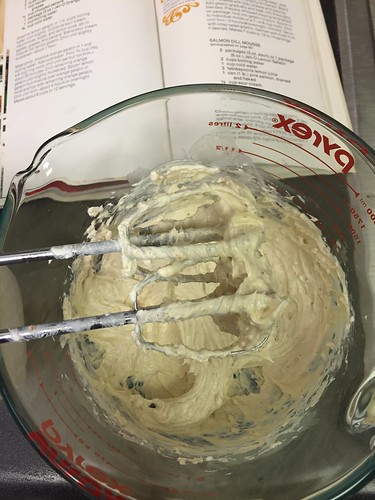
Then I removed the partially thickened gelatin from the refrigerator:
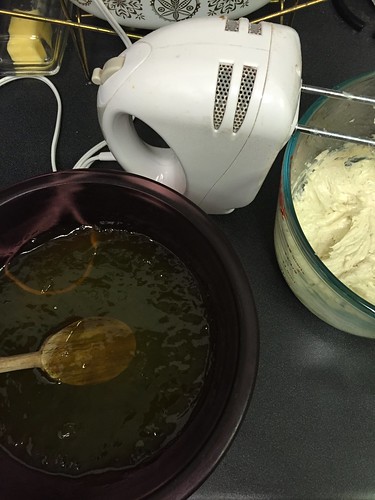
and blended them together:
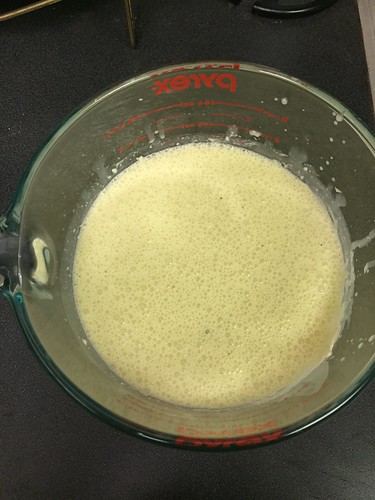
It looks about how you would think it would look, but it's not even close to done. After mixing the gelatin and cheese, you have to gently fold in an entire tub of whipped topping:
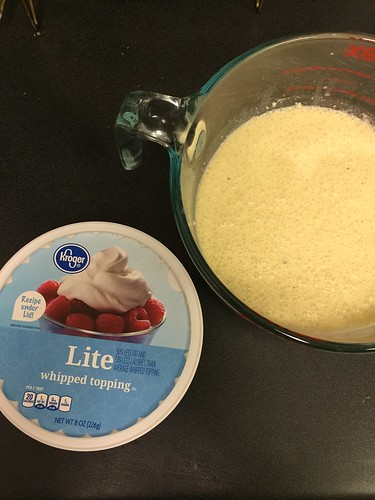
Once that's done:
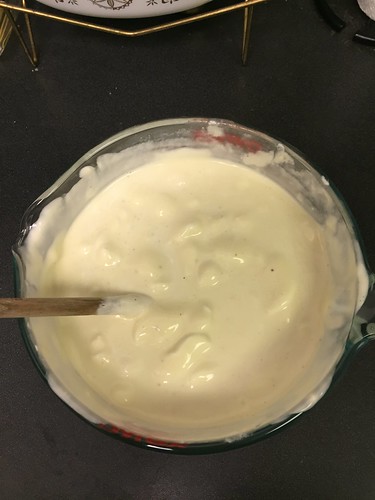
I poured it into my Bundt cake pan, since I don't own any molds big enough to handle seven cups of salad, covered the top in plastic wrap, and put it in the refrigerator overnight to firm up.
Then, last night, I went ahead and opened the wine. As if a metaphor for the entire relationship that spawned the gift of the wine bottle to begin with, the cork broke while I was uncorking it:
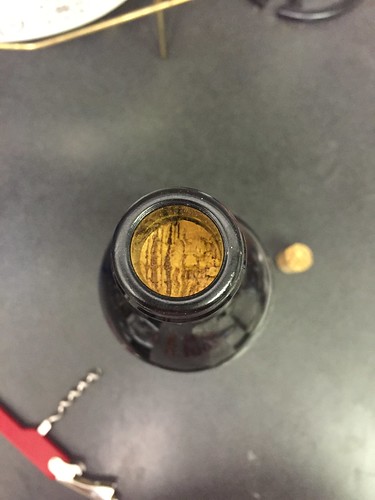
The bottom of the cork also crumbled into the wine, but I figured I could skim the pieces of cork off of the top and try it anyway, and while the wine was breathing, I could unmold the gelatin:
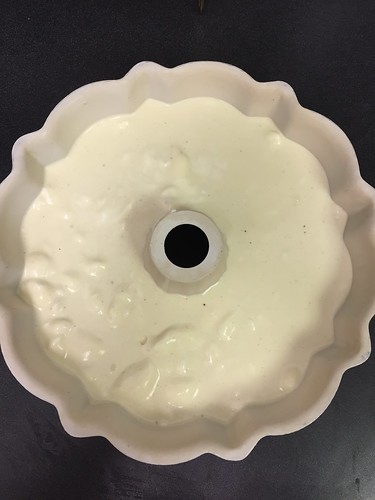
Unmolding Jell-O can be tricky, and I dipped this mold a little too long, so it came out a little wet but mostly serviceable:
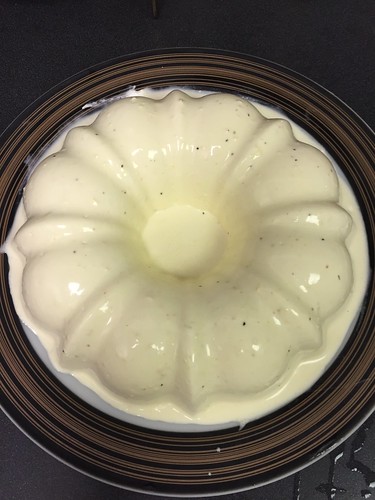
The only thing left to do was taste it:
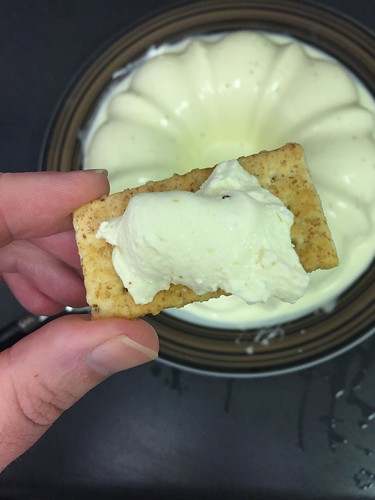
It didn't taste like bleu cheese at all. It didn't taste like lemon, either, which is a plus. It tasted sort of like cheese, but with a really light texture. I ended up eating quite a bit of it before I remembered that I was supposed to be eating the cheese and crackers with the wine:
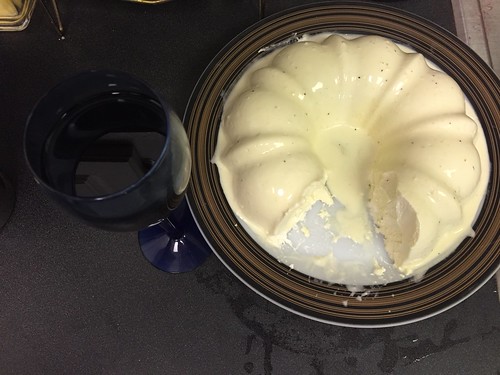
The wine was terrible.
I poured it down the drain.

It's been sitting around since I moved here, because I haven't really had an occasion to drink it. I've had lots of occasions to drink wine, and have consumed a lot of wine in my apartment in glasses and in food, but I haven't had occasion to drink that specific bottle of wine because I was waiting for a special occasion. Back when I was moving from Albany to Tennessee my non-boyfriend boyfriend gave me this bottle of wine as a going away present.
"This is really good wine, and I want you to save this bottle until you have something really good to celebrate, like you win the lottery, or you and a guy move in together, or you get your next promotion, and then you go ahead and drink this wine to celebrate."
When I moved here, my friend Tiffany kept it in her car on the passenger seat for the entire ride down, so that it would stay in the air conditioning and not get broken in the U-Haul truck. I've had that bottle sitting in my wine rack since 2006.
This is not to say that I haven't had special occasions. I've gotten raises and reclassifications. I got a new car. I went on some dates. A whole bunch of stuff has happened, but every time something came up and I thought about opening the wine, I thought, "Well, is this special enough? Is this worth my special bottle of special wine, or will something even better happen and then I'll feel bad about drinking this?"
I kind of forgot something important, though: You will never appreciate the things that you have if you are too busy waiting for something better.
Devaluing my special occasions in the hope that some other, more special occasion will happen in the future is stupid.
So is saving this bottle of wine.
I was thinking about that the other day when I was cleaning the kitchen and my eyes fell upon the special bottle of special wine and I thought, "How special is that, anyway?" It turns out that it's not actually that special. Being the sensitive, kind, thoughtful person that he was, my non-boyfriend boyfriend left the price tag on the back of the bottle, and I discovered that not only is his special wine not all that special, but it has actually depreciated in value since he bought it. I laughed and laughed and laughed, because it turns out that he knew as much about wine as he did about anything, really, and then I thought, "Well, shit, I might as well just go ahead and drink this."
I didn't want to just pop the cork and drink it at the kitchen counter (actually, I kind of did, but I decided to be a civilized person), so I decided to pick up some crackers and cheese, and have a wine night. While I was buying the cheese, though, a terrible thought occurred to me:
Wasn't there a cheese recipe in the Jello book?
You bet there was.
Friday night I got started on the Bleu Cheese Salad Mold, which the Jell-O book suggests is appropriate for special occasions, including weddings. Since that book was published around the time of my parents' wedding, and my parents had a pot-luck wedding reception, I texted my mom to ask, "Hey, did anyone serve anything at your wedding made of Jello?"
It's been over an hour, and she has not responded.
The Bleu Cheese mold started by adding salt to two boxes of lemon Jell-O prepared according to package directions and then putting the gelatin in the refrigerator until it was slightly thickened. While that was happening, I blended a softened block of cream cheese, various spices, and a half cup of crumbled bleu cheese together:

Then I removed the partially thickened gelatin from the refrigerator:

and blended them together:

It looks about how you would think it would look, but it's not even close to done. After mixing the gelatin and cheese, you have to gently fold in an entire tub of whipped topping:

Once that's done:

I poured it into my Bundt cake pan, since I don't own any molds big enough to handle seven cups of salad, covered the top in plastic wrap, and put it in the refrigerator overnight to firm up.
Then, last night, I went ahead and opened the wine. As if a metaphor for the entire relationship that spawned the gift of the wine bottle to begin with, the cork broke while I was uncorking it:

The bottom of the cork also crumbled into the wine, but I figured I could skim the pieces of cork off of the top and try it anyway, and while the wine was breathing, I could unmold the gelatin:

Unmolding Jell-O can be tricky, and I dipped this mold a little too long, so it came out a little wet but mostly serviceable:

The only thing left to do was taste it:

It didn't taste like bleu cheese at all. It didn't taste like lemon, either, which is a plus. It tasted sort of like cheese, but with a really light texture. I ended up eating quite a bit of it before I remembered that I was supposed to be eating the cheese and crackers with the wine:

The wine was terrible.
I poured it down the drain.
Thursday, July 16, 2015
Sole-lessness
The day: Today
The time: 7:55 AM
The place: The sidewalks of campus, half a mile from my car and half a mile from my office
The situation: The soles of my shoes are on the sidewalk.
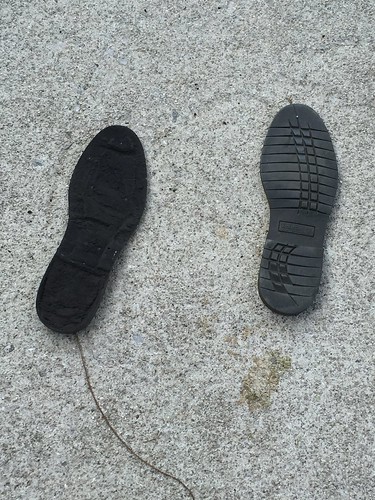
The soles of my shoes are not on my shoes.
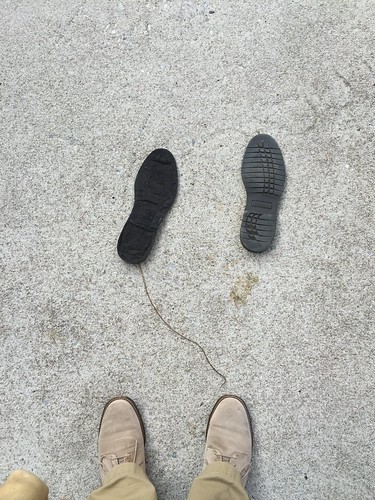
Those photos are a dramatic recreating of 7:55 AM, which I took on my way back to the car much later today. At 7:55 AM, I was too busy freaking out about the fact that my shoes were disintegrating as I walked across campus.
I used to be very fashionable. I had closets and closets full of clothes, and still own most of them even though I don't fit into them at the moment. I had belts, and watches, and jewelry, and jackets and coats and sometimes hats, and at one point I had somewhere around 20 or so pairs of shoes that were in regular use. I might wear two or three different outfits in one day depending on my itinerary, because I was a hall director and lived where I worked and could run home to change if plans changed by walking across the lobby.
I ironed my shirt before I wore it to the mall.
I had an Express card.
Among the 20 or so pairs of shoes there were a few that I especially loved, including my steel toed Doc Martens, my brown Cole Haan ankle boots, and my J Crew buck Oxfords. I wore the hell out of those buck Oxfords, and always referred to them as my buck Oxfords to differentiate them from the ones I had in other colors. I don't know if "buck" actually is a legitimate color, but there was a stretch in my twenties when I automatically described all colors according to the hues in a J Crew catalog. My sweaters came in Lake and Moss and Charcoal, my shirts in Sky and Butter and Ketchup, and those Oxfords, which should probably just have been called Taupe, were instead Buck.
I loved my buck Oxfords, but one day my buck Oxfords wore out, because J Crew made cheap shoes that only lasted a season.
I mourned the loss of my buck Oxfords by searching and searching until I found a similar pair. They had to be leather, but not shiny leather. Suede was ok, although it meant I could only wear them on sunny days. J Crew stopped making the buck Oxfords after my pair wore out, so I couldn't just order another, and I didn't want to order shoes online because I needed to see them in person and make sure they were the exact shade of buck Oxford to match the vintage London Fog jacket that I stole from my father's closet since he never wore it anyway and it was a fantastic coat. Eventually, I found a pair of similar shoes made by Timberland, and decided they were close enough to my beloved buck Oxfords.
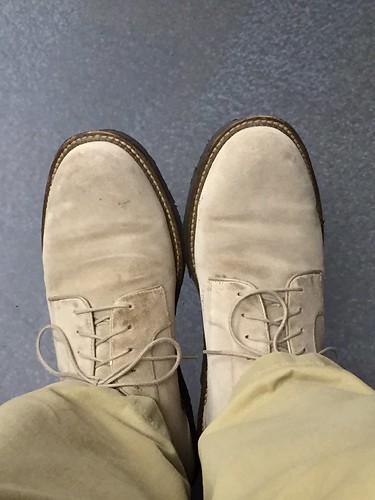
They're great shoes, right?
I haven't worn them since about 2005, because they got too tight and I couldn't fit my feet into them. They've been sitting in my closet all this time, just waiting for the day when they might live again, and that day was today. Last night I went to the shoe store to find some new black work shoes, because I wore out another pair. Not having black work shoes means I can't wear black pants to work, and that severely limits my outfit options. I just bought my last pair of black shoes a few months ago, but a few months of constant walking on sidewalks and uncarpeted floors at work for several miles each day tends to kill them pretty quickly, and I went a little too cheap last time so they didn't last nearly as long.
Fashionable me would never have bought such cheap shoes to begin with, but older me has slightly different priorities.
When I was trying work shoes on last night, I started with a pair of size 10. This has been my size for a few months, so I thought it was still my size, but one of the things that people don't ever mention about losing a lot of weight is that you will lose it in strange places, like your feet. When I started my fitness journey last July, I wore a size ten and a half shoe. As of last night, I wear a nine and a half. I put the size tens on first and thought, Why are these so loose? Are they too big? Maybe I should try a nine and a half? Could I have lost a half a shoes size?
OH MY GOD, I BET MY BUCK OXFORDS FIT AGAIN.
And this morning, they did.
I hauled them out of the closet, checked them against today's planned outfit, and laced those babies back up because, damn it, I am thinner now. I can wear things that I used to love wearing. I am changing my life, and I am on the road to wearing the shirt hanging on my wall. I parked my car a mile from my office, straightened my messenger bag (it has to hang a certain way so that it doesn't interfere with the movement of my right arm, where my Fitbit is, or else the steps won't count), and started to hike across the entire length of campus to the office, ready to face my day.
It never occurred to me that my shoes haven't just been sitting idle in a closet for ten years, but have instead been slowly dry-rotting all through their soles.
About halfway to my office I felt like I was walking on something weird with my left foot, like I'd stepped on a stick or a piece of wire and it was somehow tangled around the bottom of my shoe. I looked down, and everything looked fine, but on my next step I felt it again. Annoyed, I gave a hard kick to shake off whatever it was, and the entire bottom of my shoe went flying down the sidewalk. Stupidly, I blinked at it for a minute, confused.
Did my shoe just fall apart? How am I going to walk around all day if one shoe has a heel and the other doesn't?
Fortunately the problem solved itself, sort of. As I walked up the sidewalk toward the sole of my left shoe, the sole of the right one fell off, too.
I wanted to laugh, but I also had no idea what to do.
How do I go to work with no shoes?
I should probably go home and get new shoes.
The car is half a mile from here. Also, by the time I get back to the car, get home, get new shoes, get back to campus, and then walk to the office I'll be late for my first meeting.
What the hell am I supposed to do now?
I did what any rational, practical person would do: I picked up the soles of my shoes, put them in my messenger bag, and walked six and a half miles at work and the grocery store today in shoes that had no soles:
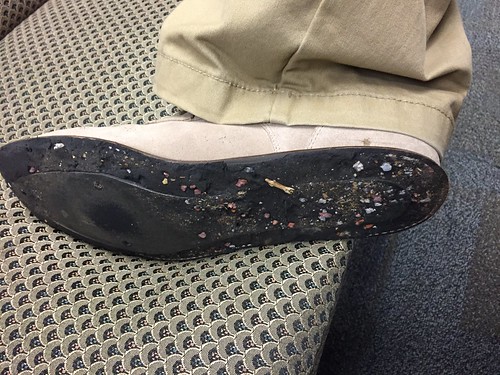
Now I just have to take them to the shoe store and get them re-soled, because they are my buck Oxfords.
And I fit into them again.
The time: 7:55 AM
The place: The sidewalks of campus, half a mile from my car and half a mile from my office
The situation: The soles of my shoes are on the sidewalk.

The soles of my shoes are not on my shoes.

Those photos are a dramatic recreating of 7:55 AM, which I took on my way back to the car much later today. At 7:55 AM, I was too busy freaking out about the fact that my shoes were disintegrating as I walked across campus.
I used to be very fashionable. I had closets and closets full of clothes, and still own most of them even though I don't fit into them at the moment. I had belts, and watches, and jewelry, and jackets and coats and sometimes hats, and at one point I had somewhere around 20 or so pairs of shoes that were in regular use. I might wear two or three different outfits in one day depending on my itinerary, because I was a hall director and lived where I worked and could run home to change if plans changed by walking across the lobby.
I ironed my shirt before I wore it to the mall.
I had an Express card.
Among the 20 or so pairs of shoes there were a few that I especially loved, including my steel toed Doc Martens, my brown Cole Haan ankle boots, and my J Crew buck Oxfords. I wore the hell out of those buck Oxfords, and always referred to them as my buck Oxfords to differentiate them from the ones I had in other colors. I don't know if "buck" actually is a legitimate color, but there was a stretch in my twenties when I automatically described all colors according to the hues in a J Crew catalog. My sweaters came in Lake and Moss and Charcoal, my shirts in Sky and Butter and Ketchup, and those Oxfords, which should probably just have been called Taupe, were instead Buck.
I loved my buck Oxfords, but one day my buck Oxfords wore out, because J Crew made cheap shoes that only lasted a season.
I mourned the loss of my buck Oxfords by searching and searching until I found a similar pair. They had to be leather, but not shiny leather. Suede was ok, although it meant I could only wear them on sunny days. J Crew stopped making the buck Oxfords after my pair wore out, so I couldn't just order another, and I didn't want to order shoes online because I needed to see them in person and make sure they were the exact shade of buck Oxford to match the vintage London Fog jacket that I stole from my father's closet since he never wore it anyway and it was a fantastic coat. Eventually, I found a pair of similar shoes made by Timberland, and decided they were close enough to my beloved buck Oxfords.

They're great shoes, right?
I haven't worn them since about 2005, because they got too tight and I couldn't fit my feet into them. They've been sitting in my closet all this time, just waiting for the day when they might live again, and that day was today. Last night I went to the shoe store to find some new black work shoes, because I wore out another pair. Not having black work shoes means I can't wear black pants to work, and that severely limits my outfit options. I just bought my last pair of black shoes a few months ago, but a few months of constant walking on sidewalks and uncarpeted floors at work for several miles each day tends to kill them pretty quickly, and I went a little too cheap last time so they didn't last nearly as long.
Fashionable me would never have bought such cheap shoes to begin with, but older me has slightly different priorities.
When I was trying work shoes on last night, I started with a pair of size 10. This has been my size for a few months, so I thought it was still my size, but one of the things that people don't ever mention about losing a lot of weight is that you will lose it in strange places, like your feet. When I started my fitness journey last July, I wore a size ten and a half shoe. As of last night, I wear a nine and a half. I put the size tens on first and thought, Why are these so loose? Are they too big? Maybe I should try a nine and a half? Could I have lost a half a shoes size?
OH MY GOD, I BET MY BUCK OXFORDS FIT AGAIN.
And this morning, they did.
I hauled them out of the closet, checked them against today's planned outfit, and laced those babies back up because, damn it, I am thinner now. I can wear things that I used to love wearing. I am changing my life, and I am on the road to wearing the shirt hanging on my wall. I parked my car a mile from my office, straightened my messenger bag (it has to hang a certain way so that it doesn't interfere with the movement of my right arm, where my Fitbit is, or else the steps won't count), and started to hike across the entire length of campus to the office, ready to face my day.
It never occurred to me that my shoes haven't just been sitting idle in a closet for ten years, but have instead been slowly dry-rotting all through their soles.
About halfway to my office I felt like I was walking on something weird with my left foot, like I'd stepped on a stick or a piece of wire and it was somehow tangled around the bottom of my shoe. I looked down, and everything looked fine, but on my next step I felt it again. Annoyed, I gave a hard kick to shake off whatever it was, and the entire bottom of my shoe went flying down the sidewalk. Stupidly, I blinked at it for a minute, confused.
Did my shoe just fall apart? How am I going to walk around all day if one shoe has a heel and the other doesn't?
Fortunately the problem solved itself, sort of. As I walked up the sidewalk toward the sole of my left shoe, the sole of the right one fell off, too.
I wanted to laugh, but I also had no idea what to do.
How do I go to work with no shoes?
I should probably go home and get new shoes.
The car is half a mile from here. Also, by the time I get back to the car, get home, get new shoes, get back to campus, and then walk to the office I'll be late for my first meeting.
What the hell am I supposed to do now?
I did what any rational, practical person would do: I picked up the soles of my shoes, put them in my messenger bag, and walked six and a half miles at work and the grocery store today in shoes that had no soles:

Now I just have to take them to the shoe store and get them re-soled, because they are my buck Oxfords.
And I fit into them again.
Friday, July 3, 2015
Five Hundred Twenty-Five Thousand Six Hundred Minutes
If you've ever looked at motivational quotes for more than ten minutes, you've probably run across the one that asks:
How do you eat an elephant?
One bite at a time.
Most of us will not actually eat an elephant, which is fortunate since some species of elephant are endangered. What you're supposed to take away from that task is that you approach a large, potentially overwhelming task a little piece at a time. You sit down with your knife and fork and slowly saw away at that elephant, and eventually some of the elephant disappears.
It's been a year since I announced to the world that I was morbidly obese and was going to change that. When I wrote that first blog about it, I titled it "The Elephant in the Room", and I was thinking of the elephant in two ways. One was the figure of speech, where an elephant in the room is a large, obvious topic that everyone awkwardly talks around but doesn't actually want to discuss. The other way I was thinking about it was as a description of myself. Mentally, I was the elephant.
I've come a long way in my self-description since then, but I'm not going to say that it's been easy, and that I'm always there. Just yesterday at work, for example, one of my coworkers tried to talk me out of walking downtown for a meeting with my umbrella because it was raining, and I blurted, "I'm still fat even if it's raining." Technically, this is true. It's been a year, and I'm still obese. Granted, I've moved from morbidly obese to just regular obese, but I'm obese. This is true. I just still struggle sometimes with phrasing it in a way that isn't self-abusive. Most days, I can do that. Some days I can't.
I take two steps forward, and I take two steps back.
All four of those steps end up in my daily step total, so there's at least one positive.
As for the rest of the elephant, I've been eating it, one bite at a time. In my particular case, I've been eating it in steps, slowly devouring the elephant and the Earth itself one step at a time. According to Fitbit I've taken 4,691,309 steps since I activated my Fitbit Flex on June 28, 2014. That converts to 2,346 miles, more or less. If I left my porch and started walking 2,346 miles in any direction, I would reach:
Every other state in the United States except Alaska and Hawaii. And I'm closing in on Alaska.
Most of Canada.
Greenland.
Venezuela and Colombia. Along the way I would have passed all of Mexico, most of the Caribbean, and all of Central America.
It's only 141 miles short of the equator.
I've taken 4,691,309 bites out of the elephant.
I started out at 295 pounds, and this morning after I got up and walked ten miles, two of them in the rain (because this is something I do now on days off; I wake up and walk distances that would have seemed insurmountable a year ago, and I do it for fun, without being chased) I weighed in at 221. I'm one pound short of losing all the weight I gained back in April by backsliding and going off program, and I am twelve pounds short of being overweight instead of obese. If you're wondering what 74 pounds of lost weight looks like, my friend Miggs put together this photo:
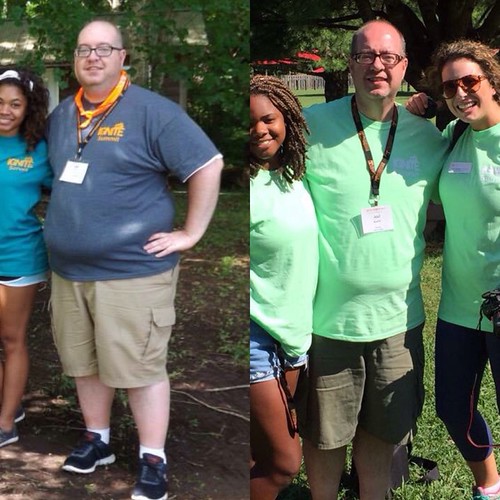
I've always known that I was stubborn and full of willpower, but if I was going to find this kind of drive in myself then I might as well have just put in for a sabbatical from work to go on "The Biggest Loser" and gotten some money out of it. Actually, given that being on that show gives people injuries, psychological scars, and most of them end up gaining the weight back, making a choice to slowly and deliberately work on this by exercising, dieting, and attempting to change my habits was probably the wiser course. And it did pay off a little bit: several friends have sent books, t-shirts, an inspiration board to hang my race bibs on (because I do that now, too; I walk in timed races where I beat other people and do not come in last place), amazon gift certificates, and pledges to races where I'm actually trying to raise money. Dozens and dozens of other friends have offered words of support, tweets, texts, and hugs.
In case I haven't been thankful enough to those people: Thanks, friends.
I've gained other things as well. I can take the stairs now. I can, and usually do, walk across campus for a meeting in a reasonable amount of time. I can walk into a store to look at clothes and feel reasonably confident that they will have my size in stock on a rack that's not in a special section. I park 1.3 miles from my office every morning and the idea that I will walk that every morning does not overwhelm me.
(I had to work up to that, though. The odyssey of my parking space probably deserves its own blog entry, as over the course of the year I've moved from the farthest space in my assigned lot to the farthest corner of the parking garage to the rec center lot to the last staff lot on the westernmost edge of the campus to a staff lot over the bridge and on the Ag Campus. Part of the reason I'm thinking of moving downtown, honestly, is that I could walk to and from work every day, and never move my car at all.)
I've noticed something else over the past few weeks, too:
I have become average.
When I'm out shopping, or at a festival (Knoxville has a ton of festivals) or a play or something, I look around at all of the other people and catch my reflection in a window or a fountain and I look like most men my age. Here, look at this other photo from last weekend:
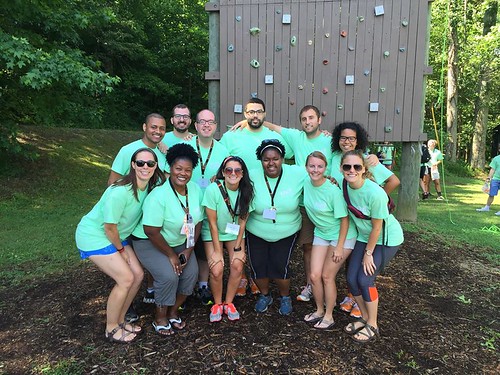
My head is the same size as everyone else's.
I have one chin.
I look like everyone else in the picture.
Over the past year, people have asked me when I'm going to be done, and when I'll be happy with the way I look. I've struggled with answers to that, the same way it took me months to figure out what to say to people when they say, "Look how skinny you are now!" and my immediate impulse is to want to say, "I'm still obese!" I've been using, "Thanks, I'm working on that," for the past few months. It acknowledges and appreciates their comment, lets them know that the weight loss was deliberate (a necessity I realized after a campus administrator that I hadn't seen for a couple of months took me aside after a meeting and quietly asked if I was losing weight on purpose or if something was wrong and there was anything she could do to help), and is a hell of a lot less awkward and argumentative than insisting that no, I'm not skinny yet.
There are two answers to the question, though.
The first is that I will never be "done". Even when I move from obese to just overweight, I would still like to get down to an average weight someday. I've only rarely been there during my adult life, and I may not make it there again, but I'm going to keep trying. Whatever weight I am, though, I will have to maintain fitness to maintain it. There are places I want to go and things I want to eat and I want to be able to take a day off from fitness every once in a while without worrying about the consequences. If I was just going for weight loss, where I could pick a goal weight at the end and be done, then I could answer that question, but instead I'm trying to be healthy. That means there's never going to be a point when I can throw my shoes away and say, "That's it, I'm healthy now!"
The second answer is that I'm already happy. I could be happier, of course. There are clothes that I haven't fit back into and I still need to hit the milestone goal I set for that trip to Venice, but right now I'm happier than I was, and that's an achievement, too.
Now I just have to set my sights on the equator, and keep walking.
How do you eat an elephant?
One bite at a time.
Most of us will not actually eat an elephant, which is fortunate since some species of elephant are endangered. What you're supposed to take away from that task is that you approach a large, potentially overwhelming task a little piece at a time. You sit down with your knife and fork and slowly saw away at that elephant, and eventually some of the elephant disappears.
It's been a year since I announced to the world that I was morbidly obese and was going to change that. When I wrote that first blog about it, I titled it "The Elephant in the Room", and I was thinking of the elephant in two ways. One was the figure of speech, where an elephant in the room is a large, obvious topic that everyone awkwardly talks around but doesn't actually want to discuss. The other way I was thinking about it was as a description of myself. Mentally, I was the elephant.
I've come a long way in my self-description since then, but I'm not going to say that it's been easy, and that I'm always there. Just yesterday at work, for example, one of my coworkers tried to talk me out of walking downtown for a meeting with my umbrella because it was raining, and I blurted, "I'm still fat even if it's raining." Technically, this is true. It's been a year, and I'm still obese. Granted, I've moved from morbidly obese to just regular obese, but I'm obese. This is true. I just still struggle sometimes with phrasing it in a way that isn't self-abusive. Most days, I can do that. Some days I can't.
I take two steps forward, and I take two steps back.
All four of those steps end up in my daily step total, so there's at least one positive.
As for the rest of the elephant, I've been eating it, one bite at a time. In my particular case, I've been eating it in steps, slowly devouring the elephant and the Earth itself one step at a time. According to Fitbit I've taken 4,691,309 steps since I activated my Fitbit Flex on June 28, 2014. That converts to 2,346 miles, more or less. If I left my porch and started walking 2,346 miles in any direction, I would reach:
Every other state in the United States except Alaska and Hawaii. And I'm closing in on Alaska.
Most of Canada.
Greenland.
Venezuela and Colombia. Along the way I would have passed all of Mexico, most of the Caribbean, and all of Central America.
It's only 141 miles short of the equator.
I've taken 4,691,309 bites out of the elephant.
I started out at 295 pounds, and this morning after I got up and walked ten miles, two of them in the rain (because this is something I do now on days off; I wake up and walk distances that would have seemed insurmountable a year ago, and I do it for fun, without being chased) I weighed in at 221. I'm one pound short of losing all the weight I gained back in April by backsliding and going off program, and I am twelve pounds short of being overweight instead of obese. If you're wondering what 74 pounds of lost weight looks like, my friend Miggs put together this photo:

I've always known that I was stubborn and full of willpower, but if I was going to find this kind of drive in myself then I might as well have just put in for a sabbatical from work to go on "The Biggest Loser" and gotten some money out of it. Actually, given that being on that show gives people injuries, psychological scars, and most of them end up gaining the weight back, making a choice to slowly and deliberately work on this by exercising, dieting, and attempting to change my habits was probably the wiser course. And it did pay off a little bit: several friends have sent books, t-shirts, an inspiration board to hang my race bibs on (because I do that now, too; I walk in timed races where I beat other people and do not come in last place), amazon gift certificates, and pledges to races where I'm actually trying to raise money. Dozens and dozens of other friends have offered words of support, tweets, texts, and hugs.
In case I haven't been thankful enough to those people: Thanks, friends.
I've gained other things as well. I can take the stairs now. I can, and usually do, walk across campus for a meeting in a reasonable amount of time. I can walk into a store to look at clothes and feel reasonably confident that they will have my size in stock on a rack that's not in a special section. I park 1.3 miles from my office every morning and the idea that I will walk that every morning does not overwhelm me.
(I had to work up to that, though. The odyssey of my parking space probably deserves its own blog entry, as over the course of the year I've moved from the farthest space in my assigned lot to the farthest corner of the parking garage to the rec center lot to the last staff lot on the westernmost edge of the campus to a staff lot over the bridge and on the Ag Campus. Part of the reason I'm thinking of moving downtown, honestly, is that I could walk to and from work every day, and never move my car at all.)
I've noticed something else over the past few weeks, too:
I have become average.
When I'm out shopping, or at a festival (Knoxville has a ton of festivals) or a play or something, I look around at all of the other people and catch my reflection in a window or a fountain and I look like most men my age. Here, look at this other photo from last weekend:

My head is the same size as everyone else's.
I have one chin.
I look like everyone else in the picture.
Over the past year, people have asked me when I'm going to be done, and when I'll be happy with the way I look. I've struggled with answers to that, the same way it took me months to figure out what to say to people when they say, "Look how skinny you are now!" and my immediate impulse is to want to say, "I'm still obese!" I've been using, "Thanks, I'm working on that," for the past few months. It acknowledges and appreciates their comment, lets them know that the weight loss was deliberate (a necessity I realized after a campus administrator that I hadn't seen for a couple of months took me aside after a meeting and quietly asked if I was losing weight on purpose or if something was wrong and there was anything she could do to help), and is a hell of a lot less awkward and argumentative than insisting that no, I'm not skinny yet.
There are two answers to the question, though.
The first is that I will never be "done". Even when I move from obese to just overweight, I would still like to get down to an average weight someday. I've only rarely been there during my adult life, and I may not make it there again, but I'm going to keep trying. Whatever weight I am, though, I will have to maintain fitness to maintain it. There are places I want to go and things I want to eat and I want to be able to take a day off from fitness every once in a while without worrying about the consequences. If I was just going for weight loss, where I could pick a goal weight at the end and be done, then I could answer that question, but instead I'm trying to be healthy. That means there's never going to be a point when I can throw my shoes away and say, "That's it, I'm healthy now!"
The second answer is that I'm already happy. I could be happier, of course. There are clothes that I haven't fit back into and I still need to hit the milestone goal I set for that trip to Venice, but right now I'm happier than I was, and that's an achievement, too.
Now I just have to set my sights on the equator, and keep walking.
Wednesday, July 1, 2015
The Month in Books: June
I didn't plan to read books that were mostly about comic books in June. I didn't have any reading plan in mind, but when I pulled the first one off of the stack I realized there were enough books in the "To Be Read" stacks to be able to read nothing but comic book-related books for the month.
There are actually enough to last two months. Maybe three.
I have enough books waiting to be read that I can now sort them into categories.
This is not good. I have books stacked all over my living room, mostly on or under the end tables, but now there is a stack next to the coffee table, too, because the coffee table is full. In light of that, I'm going to make a promise to myself: I will not purchase any new books until I have removed at least 25 books from the apartment. Not read 25 books, but remove, because some of them are books that I will read and keep.
With that in mind, let's go ahead and look at what I read in June.
1) Marilyn Johnson's Lives in Ruins introduces us to the unglamorous world of practicing archeologists. While the public thinks of them as Indiana Jones types, digging up gold and stomping through jungles, most of them live close to the poverty line, struggling from grant to grant as they work to preserve history that is often unappreciated and unfunded. Despite the slightly depressing state of most of the people profiled, Johnson still manages to keep the story light, optimistic, and focused on the benefits of preserving our cultural heritage and the struggles of the people who fight to do so.
In an interesting side note, one of the later chapters featured a doctor working on Fort Drum, the army base my parents retired out of and which is a few miles from my house. I called my mom to ask if she knew the doctor, and it turns out that my mom actually volunteered on an excavation with her a few years ago and offered to introduce us next time I go home.
That book was a leftover from May's month of all nonfiction, and once I finished it, I moved on to the books about comics.
2) Jon Morris' The League of Regrettable Superheroes was an interesting look at some of the weirder characters through comic book publishing history. It includes many illustrations, and also outlines both the characters' fictitious histories and their publishing ones. There were only a few places where I disagreed (for example, he describes one character's ability to split off his limbs and beat people with them as unique, ignoring that rejected Legion of Superheroes applicant Arm-Fall-Off Boy also has appeared numerous times with the same power), but for the most part this was entertaining and informative.
The book was also pretty brutal toward the Legion of Super Pets, too. I get that they're a little dorky, and definitely one of the more hilarious parts of the silver age, but almost every comic company had at least one animal sidekick appearing regularly, so singling out the Super Pets (who haven't been published in decades) while ignoring the fact that Marvel is still publishing adventures of the Pet Avengers is a little unfair.
Don't just take my word for it, though. Let's see what Krypto and Streaky (or maybe Whizzy), founding members of the Legion of Superpets, thought:
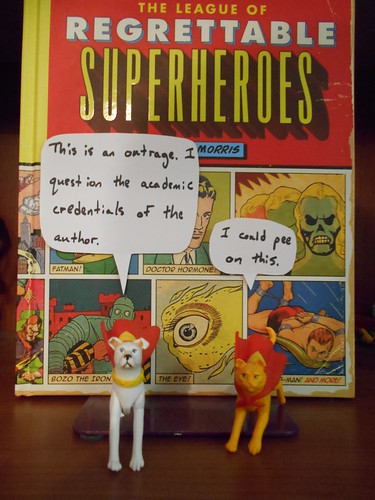
That's that, I guess.
3) You know that feeling you get when you realize that a book is taking on so much that there's not going to be a way to tie the plot up in the number of pages that are left? That happened to me while reading Lexie Dunne's Superheroes Anonymous, so I was already prepared for it to jerk to a stop mid-plot with "To Be Continued" but I was also annoyed that the paperback copy doesn't have a "Book One" or "One of Two" on it anywhere. If it did, I might have bought them both together and been able to fully evaluate the story, but since it didn't, I feel like I'm judging half of a book.
In the first part of the story, we are introduced to Gail Godwin, nicknamed Hostage Girl by the press because she tends to get kidnapped by supervillains, over and over, and always rescued by the Blaze, who might also secretly be her boyfriend, Jeremy. When Jeremy and the Blaze both move to Miami in the same week, leaving Gail behind in Chicago, no one tells the evil Dr. Mobius, who kidnaps her and injects her with chemicals, intending to blackmail the Blaze for the antidote. The Blaze never arrives, though, and the chemicals transform Gail into something else, something superpowered. Whisked away into a world of capes and costumes, Hostage Girl struggles to understand her new powers and to find a way to keep the cancer that they've given her from killing her, and also to learn the truth about Jeremy and the Blaze, and also to understand why Dr. Mobius kidnapped her in the first place, but... oops, To Be Continued. This was sort of interesting, and if I had the second book on hand I might have started reading immediately, but this seemed kind of run of the mill, and not worth the effort of even downloading the sequel to my kindle. I didn't find myself really liking or caring about any of the characters enough to wonder what happens to them.
4) Speaking of run of the mill, Michael Jan Friedman's X-Men: Shadows of the Past was a pretty standard X-Men novel. The most interesting thing is that the book, published in 2000, has a page at the back inviting the reader to try out something new and exciting called an "I-book", which is the future of the publishing industry.
I hope those catch on.
Original X-Men, do you have anything to add?
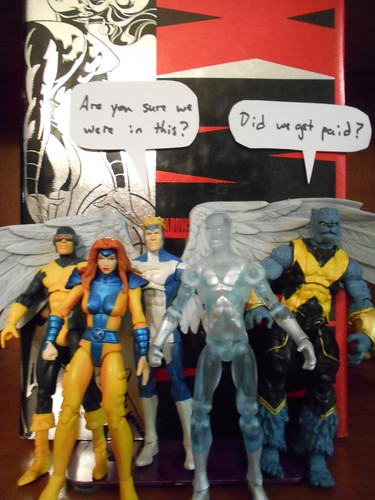
Yeah, you actually were in this. I'm not sure why. It could have been a book about anybody.
5) Gwenda Bond's Lois Lane: Fallout at least tries to imagine a new setting for the familiar characters of Lois Lane and Clark Kent, placing Lois in high school in the modern era, with an online pen pal that she's never met named "Smallville Guy". Determined to make a fresh start and permanent home at Metropolis High, Army brat Lois finds herself immediately recruited for a student newspaper and trying to help a former star student who is being bullied by the Warheads, a group of gamers who seem unstoppable both in the real world and in "Worlds War Three", the online multiplayer game that so many of Lois' new friends are playing. Is the girl just imagining the weird power the Warheads seem to have over her mind, or is there something more sinister about the weird school internship, Project Hydra, all of the Warheads are involved in? Will Lois be able to get to the bottom of the story, and if she does, will she be able to suffer the consequences?
This sounds like someone decided to write a Young Adult novel with every youthful buzzword they could find ("Video games! And bullying! And Lois and Clark can flirt over text messages! And insta-photos!") but Bond actually manages to craft a decent story with realistic characters who mostly act like real high school students.
Lois?
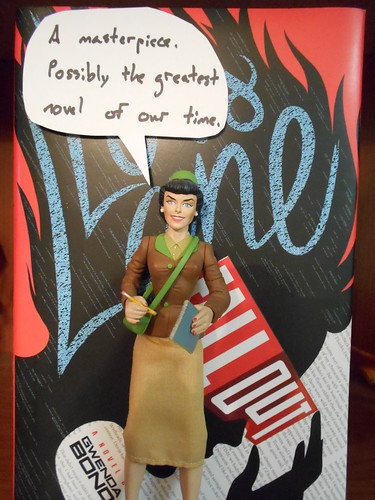
Thanks for the unbiased review. I wouldn't go quite that far, but I enjoyed it. That's more than I can say for the next book:
6) I'm not sure I can explain all the things that are wrong with Tracy Hickman's Wayne of Gotham, but I feel like just saying, "It's terrible" isn't really enough. After reading it, I'm wondering if Hickman has ever read a Batman comic book, because she never seems to actually get the characters, and instead presents a relationship where Batman resents and is distrustful of Alfred and where Alfred outright lies to Batman throughout the novel.
As bad as that is, though, the real problem is that this story of Batman uncovering a dark secret in his father's past doesn't really need to be told. Thomas and Martha Wayne, like Jor-El and Lara or Richard and Mary Parker, are props. They aren't intended to be interesting, stand alone people with hopes and fears and dreams. They are footnotes in the origin stories of the main character, and attempts to make them main characters of their own almost always turn out awkward and somewhat forced.
Batman? Alfred? Anything to add?
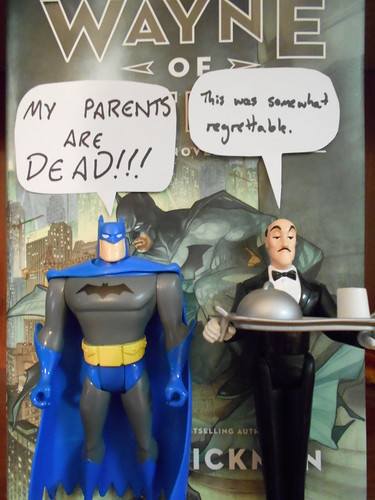
Yeah.
I finished out the month by moving away from comics for a minute:
7) Christina Henriquez' The Book of Unknown Americans is this year's freshman class "Life of the Mind" book, so I figured I would knock it out now rather than rush to finish it by August. The story of the Rivera family and their neighbors, it's realistic, but also sad, outlining their journey from Mexico to Delaware seeking medical care and therapy for their daughter, Maribel, after a terrible accident. Struggling to learn the language and adapt to their new home, they find themselves isolated, marginalized, and eventually horribly victimized.
I think the freshmen will get a lot out of this, and it will expose them to experiences that many of them have never had or spoken to anyone about, but why does every book where we expect them to learn something have to be depressing?
I'm going to keep trying to get onto the committee that selects those books, because there are good books with good messages that won't make you want to go lay down in a dark room and sob quietly.
In the meantime, I have a ton of books to read.
There are actually enough to last two months. Maybe three.
I have enough books waiting to be read that I can now sort them into categories.
This is not good. I have books stacked all over my living room, mostly on or under the end tables, but now there is a stack next to the coffee table, too, because the coffee table is full. In light of that, I'm going to make a promise to myself: I will not purchase any new books until I have removed at least 25 books from the apartment. Not read 25 books, but remove, because some of them are books that I will read and keep.
With that in mind, let's go ahead and look at what I read in June.
1) Marilyn Johnson's Lives in Ruins introduces us to the unglamorous world of practicing archeologists. While the public thinks of them as Indiana Jones types, digging up gold and stomping through jungles, most of them live close to the poverty line, struggling from grant to grant as they work to preserve history that is often unappreciated and unfunded. Despite the slightly depressing state of most of the people profiled, Johnson still manages to keep the story light, optimistic, and focused on the benefits of preserving our cultural heritage and the struggles of the people who fight to do so.
In an interesting side note, one of the later chapters featured a doctor working on Fort Drum, the army base my parents retired out of and which is a few miles from my house. I called my mom to ask if she knew the doctor, and it turns out that my mom actually volunteered on an excavation with her a few years ago and offered to introduce us next time I go home.
That book was a leftover from May's month of all nonfiction, and once I finished it, I moved on to the books about comics.
2) Jon Morris' The League of Regrettable Superheroes was an interesting look at some of the weirder characters through comic book publishing history. It includes many illustrations, and also outlines both the characters' fictitious histories and their publishing ones. There were only a few places where I disagreed (for example, he describes one character's ability to split off his limbs and beat people with them as unique, ignoring that rejected Legion of Superheroes applicant Arm-Fall-Off Boy also has appeared numerous times with the same power), but for the most part this was entertaining and informative.
The book was also pretty brutal toward the Legion of Super Pets, too. I get that they're a little dorky, and definitely one of the more hilarious parts of the silver age, but almost every comic company had at least one animal sidekick appearing regularly, so singling out the Super Pets (who haven't been published in decades) while ignoring the fact that Marvel is still publishing adventures of the Pet Avengers is a little unfair.
Don't just take my word for it, though. Let's see what Krypto and Streaky (or maybe Whizzy), founding members of the Legion of Superpets, thought:

That's that, I guess.
3) You know that feeling you get when you realize that a book is taking on so much that there's not going to be a way to tie the plot up in the number of pages that are left? That happened to me while reading Lexie Dunne's Superheroes Anonymous, so I was already prepared for it to jerk to a stop mid-plot with "To Be Continued" but I was also annoyed that the paperback copy doesn't have a "Book One" or "One of Two" on it anywhere. If it did, I might have bought them both together and been able to fully evaluate the story, but since it didn't, I feel like I'm judging half of a book.
In the first part of the story, we are introduced to Gail Godwin, nicknamed Hostage Girl by the press because she tends to get kidnapped by supervillains, over and over, and always rescued by the Blaze, who might also secretly be her boyfriend, Jeremy. When Jeremy and the Blaze both move to Miami in the same week, leaving Gail behind in Chicago, no one tells the evil Dr. Mobius, who kidnaps her and injects her with chemicals, intending to blackmail the Blaze for the antidote. The Blaze never arrives, though, and the chemicals transform Gail into something else, something superpowered. Whisked away into a world of capes and costumes, Hostage Girl struggles to understand her new powers and to find a way to keep the cancer that they've given her from killing her, and also to learn the truth about Jeremy and the Blaze, and also to understand why Dr. Mobius kidnapped her in the first place, but... oops, To Be Continued. This was sort of interesting, and if I had the second book on hand I might have started reading immediately, but this seemed kind of run of the mill, and not worth the effort of even downloading the sequel to my kindle. I didn't find myself really liking or caring about any of the characters enough to wonder what happens to them.
4) Speaking of run of the mill, Michael Jan Friedman's X-Men: Shadows of the Past was a pretty standard X-Men novel. The most interesting thing is that the book, published in 2000, has a page at the back inviting the reader to try out something new and exciting called an "I-book", which is the future of the publishing industry.
I hope those catch on.
Original X-Men, do you have anything to add?

Yeah, you actually were in this. I'm not sure why. It could have been a book about anybody.
5) Gwenda Bond's Lois Lane: Fallout at least tries to imagine a new setting for the familiar characters of Lois Lane and Clark Kent, placing Lois in high school in the modern era, with an online pen pal that she's never met named "Smallville Guy". Determined to make a fresh start and permanent home at Metropolis High, Army brat Lois finds herself immediately recruited for a student newspaper and trying to help a former star student who is being bullied by the Warheads, a group of gamers who seem unstoppable both in the real world and in "Worlds War Three", the online multiplayer game that so many of Lois' new friends are playing. Is the girl just imagining the weird power the Warheads seem to have over her mind, or is there something more sinister about the weird school internship, Project Hydra, all of the Warheads are involved in? Will Lois be able to get to the bottom of the story, and if she does, will she be able to suffer the consequences?
This sounds like someone decided to write a Young Adult novel with every youthful buzzword they could find ("Video games! And bullying! And Lois and Clark can flirt over text messages! And insta-photos!") but Bond actually manages to craft a decent story with realistic characters who mostly act like real high school students.
Lois?

Thanks for the unbiased review. I wouldn't go quite that far, but I enjoyed it. That's more than I can say for the next book:
6) I'm not sure I can explain all the things that are wrong with Tracy Hickman's Wayne of Gotham, but I feel like just saying, "It's terrible" isn't really enough. After reading it, I'm wondering if Hickman has ever read a Batman comic book, because she never seems to actually get the characters, and instead presents a relationship where Batman resents and is distrustful of Alfred and where Alfred outright lies to Batman throughout the novel.
As bad as that is, though, the real problem is that this story of Batman uncovering a dark secret in his father's past doesn't really need to be told. Thomas and Martha Wayne, like Jor-El and Lara or Richard and Mary Parker, are props. They aren't intended to be interesting, stand alone people with hopes and fears and dreams. They are footnotes in the origin stories of the main character, and attempts to make them main characters of their own almost always turn out awkward and somewhat forced.
Batman? Alfred? Anything to add?

Yeah.
I finished out the month by moving away from comics for a minute:
7) Christina Henriquez' The Book of Unknown Americans is this year's freshman class "Life of the Mind" book, so I figured I would knock it out now rather than rush to finish it by August. The story of the Rivera family and their neighbors, it's realistic, but also sad, outlining their journey from Mexico to Delaware seeking medical care and therapy for their daughter, Maribel, after a terrible accident. Struggling to learn the language and adapt to their new home, they find themselves isolated, marginalized, and eventually horribly victimized.
I think the freshmen will get a lot out of this, and it will expose them to experiences that many of them have never had or spoken to anyone about, but why does every book where we expect them to learn something have to be depressing?
I'm going to keep trying to get onto the committee that selects those books, because there are good books with good messages that won't make you want to go lay down in a dark room and sob quietly.
In the meantime, I have a ton of books to read.
Subscribe to:
Comments (Atom)